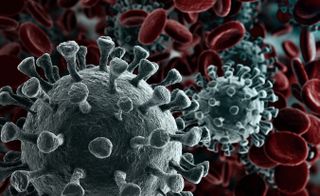
Emergency workers exit the Diamond Princess cruise ship where thousands remain quarantined.
It’s the stuff of nightmares: You’re trapped on a ship where a mysterious virus is swiftly infecting those onboard. But this is real life: Over 3,500 people remain quarantined aboard the cruise ship Diamond Princess, which is docked off the coast of Japan, after passengers tested positive for the new coronavirus.
As of today (Feb. 13), 218 people have contracted the coronavirus on the ship and have been taken to hospitals for treatment. Japan’s health minister announced today at a news conference that passengers who are older than 80 and have preexisting medical conditions, as well as passengers in rooms without windows or balconies, can disembark if they have tested negative for the virus. But the thousands of people still aboard the ship keep to their rooms, aside from a brief daily walk on the deck.
While acknowledging that quarantines can work in certain situations, some experts are skeptical that this outbreak is one of those situations.
“I think it’s been a bad decision from the start,” said Dr. Amesh Adalja, an infectious-disease specialist and a senior scholar at the Johns Hopkins Center for Health Security in Baltimore. The quarantine was “cruel and inhumane” and “created a horror show on the ocean.”
Coronavirus COVID-19: News and explainers

—See live updates on the new coronavirus
—How does the new coronavirus compare with flu?
—Why are children ‘missing’ from coronavirus outbreak?
—How experts will treat new coronavirus
—Will airport screenings be enough to stop coronavirus spread?
The ship quarantine, which has been going on for over a week, has already led to a major increase in the spread of the virus, even extending to a quarantine officer, he told Live Science. “The virus is being served up more and more victims by the Japanese government so long as this quarantine lasts,” Adalja said.
It’s very difficult to avoid contracting the virus when you’re in close quarters, he added. What’s more, this quarantine is “unnecessary,” as it’s not going to work to stop the spread of the coronavirus around the world, Adalja said.
“There’s an assumption that this [virus] isn’t everywhere and i think it already is everywhere,” Adalja said. So in this case quarantines won’t work and this will be a mild pandemic no matter what, he said. Quarantines “rarely work and they should be very seldomly used.”
Far from “ideal”
Other experts think quarantines could be successful. “Quarantines do work if they’re done properly,” said Carol Shoshkes Reiss, a professor of biology and neural science at New York University.
However, quarantining people is tricky because some measures don’t actually keep people isolated. “You want to make certain that if you are truly quarantining people that you are not doing it in a way that actually doesn’t quarantine people,” she said.
A better way to quarantine would be to break up these people into smaller groups and quarantine them separately, Reiss said. “The longer you have several thousand people cohoused in that kind of situation you will continue to propagate waves of infection,” she said.
Because the passengers are isolated in separate rooms (aside from a short walk on the deck every day), it’s possible that some of these people will not be infected, Reiss told Live Science. But it’s not clear whether the boat’s ventilation system connects one room to the next. If so, that could be a problem, as there has been previous concern that the coronavirus can spread through pipes, according to a previous Live Science report.
What’s more, stress and anxiety are known to suppress the immune system, she said, making people more susceptible to contracting the virus.
The cruise ship quarantine “is not what we would call an ideal circumstance,” as the virus probably continues to be transmitted to those aboard, said Dr. William Schaffner, an infectious-disease specialist at Vanderbilt University. In the correct context, however, quarantines can be useful, Schaffner told Live Science.
“There’s great debate about how effective [a] quarantine is,” and it depends on the nature of the virus, the population it’s threatening and how feasible it is to keep everyone in one spot. For instance, if travel had continued normally, without screenings or quarantines for people traveling from China, around the world “there would’ve been many more introductions of the coronavirus” to the U.S. and other countries, he said.
Most quarantines for this new coronavirus, including the cruise ship quarantine, have been for 14 days. That’s because research has suggested the virus’s incubation period — the time between when a person becomes infected with the virus and when they show symptoms — is somewhere between two and 14 days, according to the Centers for Disease Control and Prevention (CDC). (However, one report that hasn’t yet been peer-reviewed suggested that the incubation period can be as long as 24 days.)
The people aboard the Diamond Princess will be under a 14-day quarantine, which will end Feb. 19 for most passengers. But if anyone is diagnosed during that period (not everyone has been tested yet), the quarantine might be extended for people who have had close contact with the newly diagnosed passengers.
Sourse: www.livescience.com





